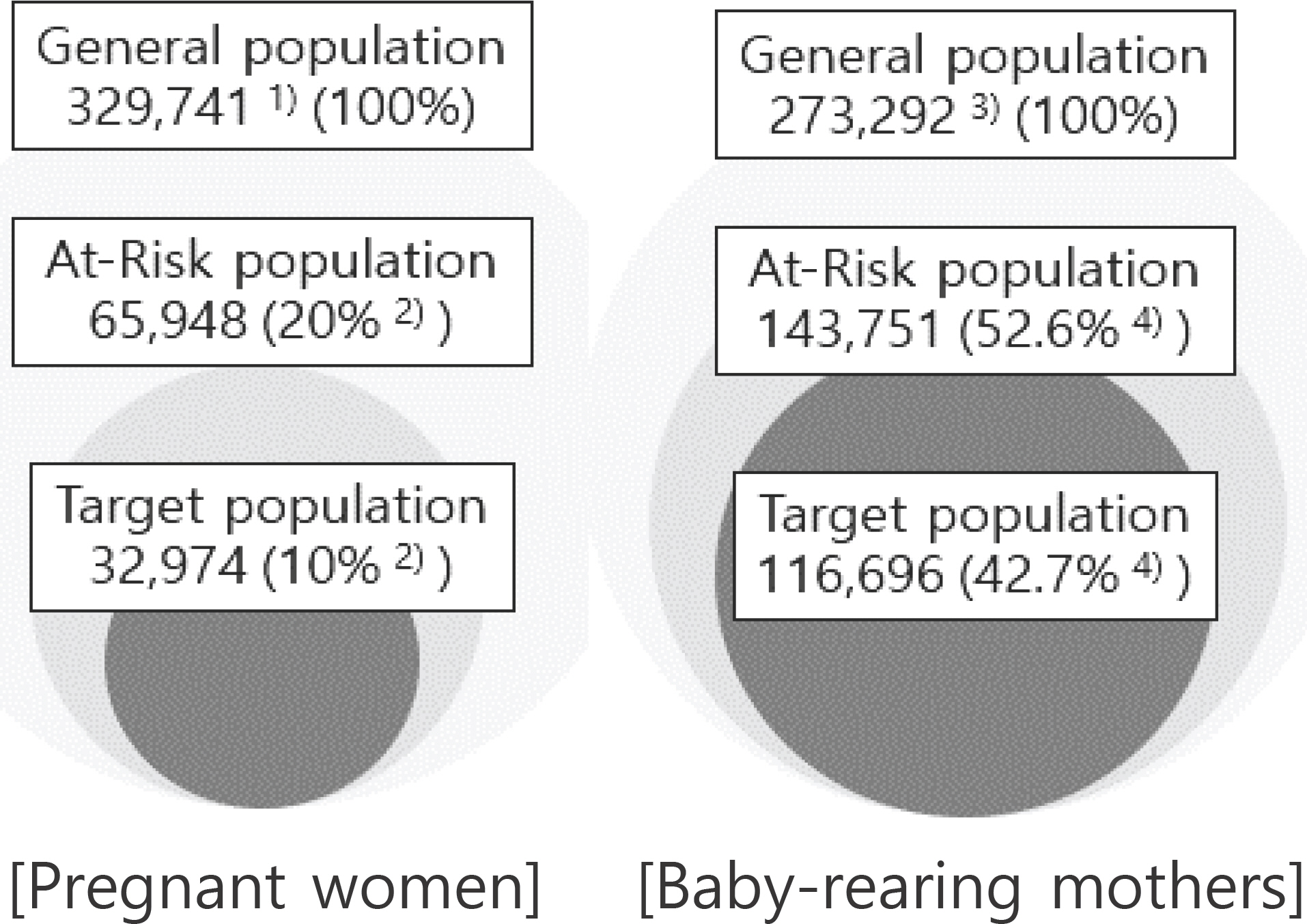Abdollahi F, Abhari FR, Zarghami M. Postpartum depression effect on child health and development. Acta Medica Iranica 2017;55:109-14.

American College of Obstetrics and Gynecology. ACOG Committee Opinion No. 757: Screening for Perinatal Depression. Obstet Gynecol 2018;132:e208-12.


American Psychiatric Association. Diagnostic and statistical manual of mental disorders, 5th ed.Arlington (VA), American Psychiatric Association, 2013.
Bellieni CV, Buonocore G. Abortion and subsequent mental health: review of the literature. Psychiatry Clin Neurosci 2013;67:301-10.


Cho HJ, Choi KY, Lee JJ, Lee IS, Park MI, Na JY, et al. A study of predicting postpartum depression and the recovery factor from prepartum depression. Korean J Perinatol 2004;115:345-54.
Chung JH. Prevalence and risk factors of pregnancy compli-cations Cheongju (Korea), Korea Disease Control and Prevention Agency, 2017.
Cox JL, Holden JM, Sagovsky R. Detection of postnatal depression. Development of the 10-item Edinburgh Postnatal Depression Scale. Br J Psychiatry 1987;150:782-6.


Crain W. Theories of development concepts and applications. 6th ed.Harlow, Pearson, 2014; 315-30.
Cranley MS. Development of a tool for the measurement of maternal attachment during pregnancy. Nurs Res 1981;30:281-5.


Han KE. The relationship of maternal self-esteem and maternal sensitivity with mother-to-infant attachment Seoul (Korea), Hanyang University, 2001.
Jun D, Johnston V, Kim JM, O'Leary S. Cross-cultural adaptation and validation of the Depression, Anxiety and Stress Scale-21 (DASS-21) in the Korean working population. Work 2018;59:93-102.


Kei F, Tomomi K, Yoshinori M, Takafumi U, Kenji I, Tomoko K, et al. Current issues within the perinatal mental health care system in Aichi prefecture, Japan: a cross-sectional questionnaire survey. Int J Environ Res Public Health 2021;18:1-14.
Kim HJ. Postpartum depression of maternities with or without occupation [dissertation] Seoul (Korea), Ewha Womans University, 2007.
Kim HO. The regulating effects of parenting variables on the mother's depression and development psychological development of the infant. Korea J Child Care Educ 2013;83:1-21.
Kim HS, Park HS, Choi A. A review on the postpartum depression management systems in Korea. J Korea Soc Matern Child Heath 2022;26:52-60.


Kim J. Relations among maternal employment, depressive symptoms, breastfeeding duration, and body mass index trajectories in early childhood. J Korea Soc Matern Child Heath 2020;24:75-84.


Kim J, Chu K, Lee SJ, Lee TH, Chon SJ, Cho SE, et al. Review and future perspectives of the Korea Counseling Center for Fertility and Depression (KCCFD) counseling service based on user characteristics: focusing on infertility. J Korean Soc Matern Child Health 2020;24:181-95.


Kim KY. Effects on maternal-infant attachment by the taegyo perspective prenatal class Seoul (Korea), Yonsei University, 2000.
Kim MJ, Park JA, Sung OH, Hong SJ, Lee KS. A longitudinal cohort study of postpartum depression: mother's mental health and parent-child relationship. Korean J Infant Mental Health 2018;11:53-73.

Kim S, Jung HY, Na KS, Lee SI, Kim SG, Lee AR, et al. A validation study of the Korean Version of Warwick-Edinburgh Mental Well-Being Scale. J Korean Neuropsychiatr Assoc 2014;53:237-45.

Kim SR, Yun DH. Effects of social support on the mothers'psychological characteristics. Korea J Child Care Educ 2014;9:41-62.
Kim YK, Won SD, Lim HJ, Choi SH, Lee SM, Shin YC, et al. Validation study of the Korean version of Edinburgh Postnatal Depression Scale (K-EPDS). Mood Emot 2005;3:42-9.
Lee EJ, Lee JY, Lee SJ, Yu SE. Influence of self-esteem and spouse support on prenatal depression in pregnant women. J Korea Soc Matern Child Heath 2020;24:212-20.


Lee SY, Lim JY, Hong JP. Policy implications for promoting postpartum mental health Sejong (Korea), Korea Institute for Health and Social Affairs, 2018.
Lim HJ. The differences of infant's temperament, mother's psychological characteristic, mother's parenting style as a function of types of employment status of mothers. Korean J Child Care Educ Policy 2013;7:190-214.
Lovibond PF, Lovibond SH. The structure of negative emotional states: comparison of the depression anxiety stress scales (DASS) with the beck depression and anxiety in-ventories. Behav Res Ther 1995;33:335-43.


Milgrom J, Ericksen J, Sved-Williams A. Impact of parental psychiatric illness on infant development. In: Sutter-Dallay AL, Glangeaud-Freudenthal NC, Guedeney A, Riecher-Rössler A. editors. Joint care of parents and infants in perinatal psychiatry Cham, Springer, 2016.

Muller ME. A questionnaire to measure mother to infant attach. J Nurs Meas 1994;2:129-41.


Park JH, Yoo YJ. The effect of family strengths and wives'self-esteem on depression among married women. J Korean Home Manag Assoc 2000;18:155-74.
Park SJ, Choi HR, Choi JH, Kim KW, Hong JP. Reliability and validity of the Korean Version of the Patient Health Questionnaire-9 (PHQ-9). Anxiety Mood 2010;6:119-24.
Shim SY. A structural analysis of the relationship among social support, maternal psychological well-being, attachment style, and young children's social-emotional competence and behavior problem. J Child Educ 2016;25:21-47.

Spitzer RL, Kroenke K, Wiliams JB. Validation and utility of a self-report version of PRIME-MD: the PHQ primary care study. Primary Evaluation of Mental Disorders. Patient Health Questionnaire. JAMA 1999;282:1737-44.


Yi HY, Chung MR. The effect of maternal depressive symptoms and parenting efficacy on preschoolers'affective empathy: multi-group analysis by mother's employment status. Korean J Women Psychol 2018;23:91-109.










